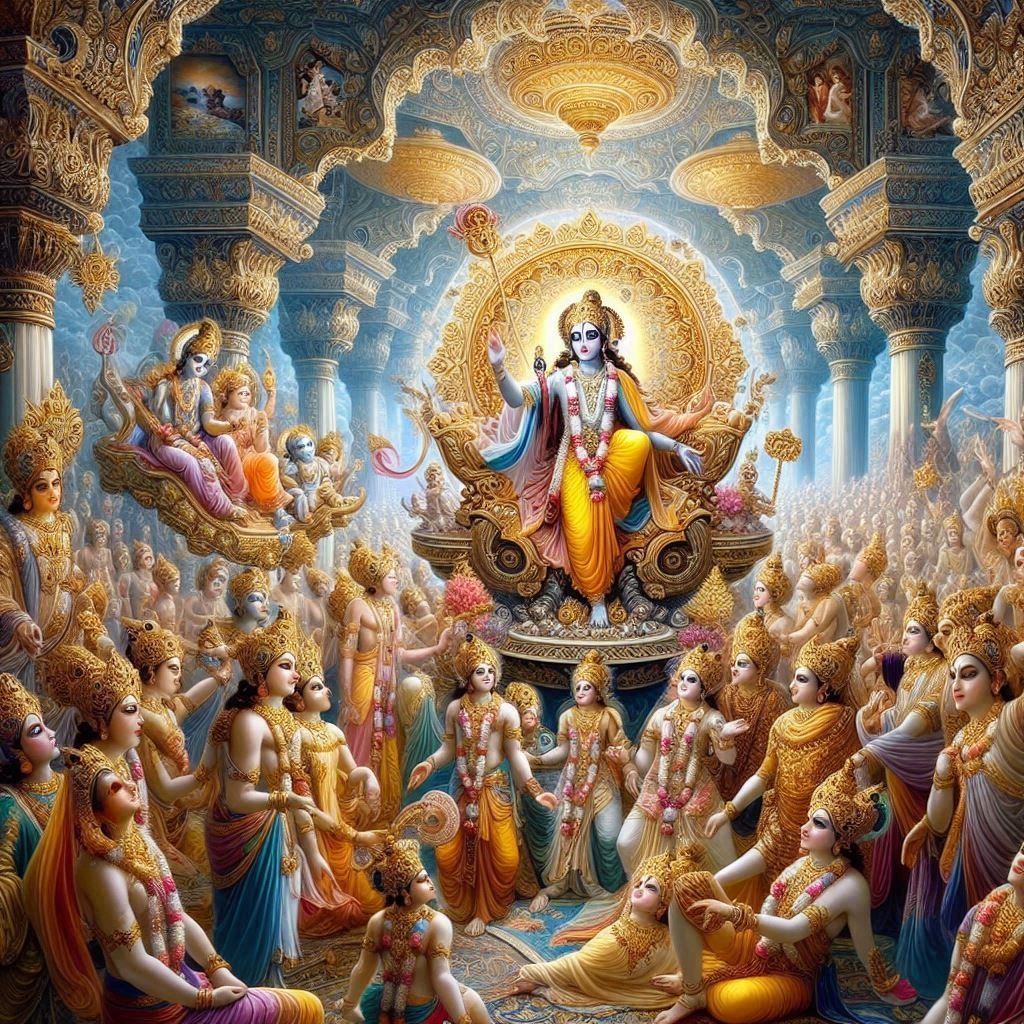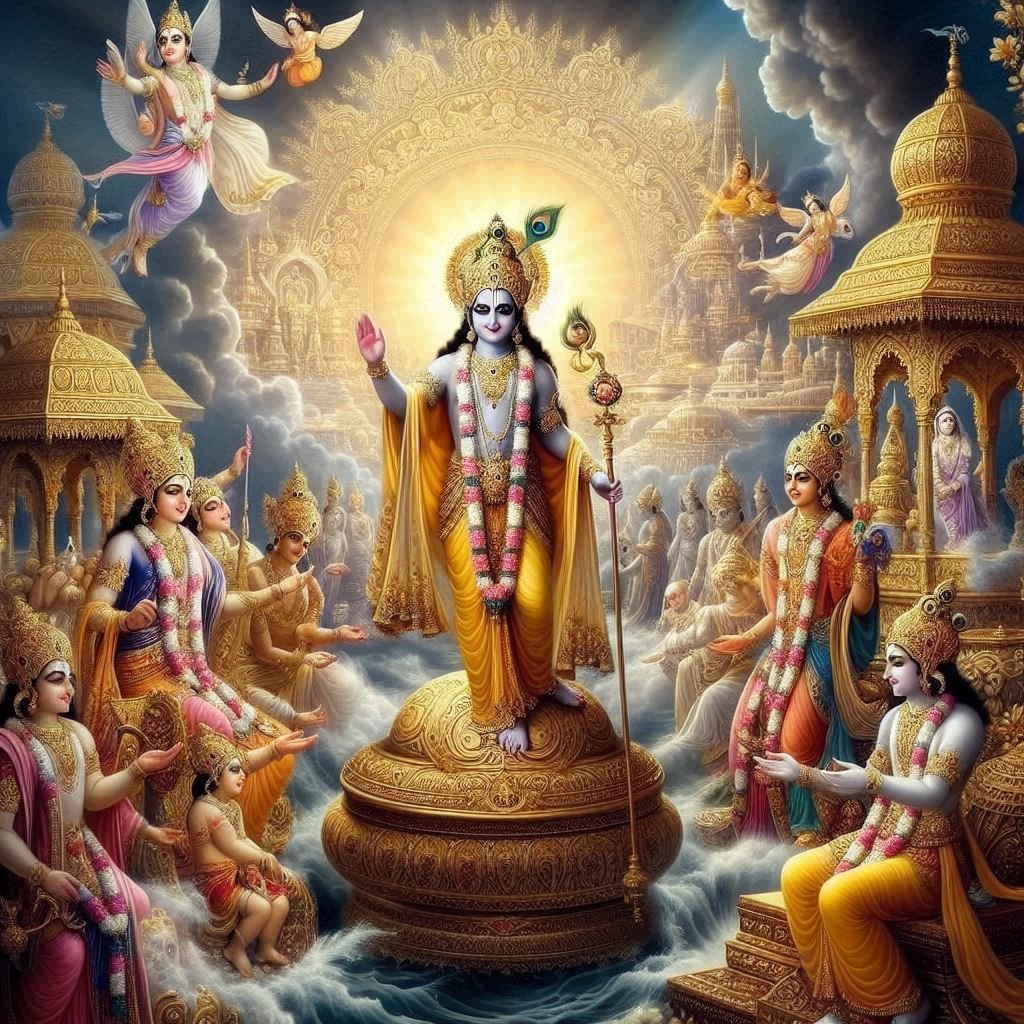The Lord said: The Supreme, imperishable entity is known as Brahman, while the individual self is referred to as adhyatma. Actions related to the material nature of living beings and their growth are termed karma, or the results of one’s deeds.
Description
In this verse, Shree Krishna emphasizes that the celestial gods lack the independent power to fulfill the material desires of their devotees. They can only grant wishes with God’s permission. The word *labhate* means “to obtain.” Devotees with limited understanding may believe they have receiveThe Vedas refer to God by various names, and Brahman is one of them. In this verse, Shree Krishna explains to Arjun that the Supreme Entity is called Brahman. Time, space, and the chain of cause and effect are all features of the material world. However, Brahman transcends these, existing beyond the material plane. Brahman is described as aksharam—indestructible—because it remains unaffected by the transformations of the universe.
The Brihadaranyak Upanishad 3.8.8 affirms, “The wise refer to Brahman as akshar (indestructible). It is also called Param (Supreme) as it possesses attributes surpassing those of maya and individual souls.”

In Sanskrit, the word adhyatma has two meanings: the science of the soul and the path to spirituality. Here, Shree Krishna uses it to refer to one’s own self, encompassing the body, mind, and intellect.
Karma refers to the fruitive actions performed by individuals, which shape their unique conditions of existence across various lifetimes. These karmas bind the soul to samsara, the cycle of material existence.d their desired material objects by pleasing the devatās, but it is actually God who orchestrates and grants everything.

भगवान ने कहा: सर्वोच्च, अविनाशी इकाई को ब्रह्म कहा जाता है, जबकि व्यक्तिगत आत्मा को अध्यात्म कहा जाता है। जीवित प्राणियों की भौतिक प्रकृति और उनके विकास से संबंधित कार्यों को कर्म, या किसी के कर्मों का परिणाम कहा जाता है।
विवरण
वेद ईश्वर को विभिन्न नामों से संदर्भित करते हैं, और ब्राह्मण उनमें से एक है। इस श्लोक में श्रीकृष्ण अर्जुन को समझाते हैं कि सर्वोच्च सत्ता को ब्रह्म कहा जाता है। समय, स्थान और कारण और प्रभाव की श्रृंखला भौतिक संसार की सभी विशेषताएं हैं। हालाँकि, ब्रह्म इनसे परे है, भौतिक स्तर से परे विद्यमान है। ब्रह्म को अक्षरम् – अविनाशी – के रूप में वर्णित किया गया है क्योंकि यह ब्रह्मांड के परिवर्तनों से अप्रभावित रहता है।
बृहदारण्यक उपनिषद 3.8.8 पुष्टि करता है, “बुद्धिमान लोग ब्रह्म को अक्षर (अविनाशी) कहते हैं। इसे परम भी कहा जाता है क्योंकि इसमें माया और व्यक्तिगत आत्माओं से भी बढ़कर गुण हैं।
संस्कृत में, अध्यात्म शब्द के दो अर्थ हैं: आत्मा का विज्ञान और आध्यात्मिकता का मार्ग। यहाँ, श्री कृष्ण इसका उपयोग स्वयं के शरीर, मन और बुद्धि को समाहित करने के लिए करते हैं।
कर्म का तात्पर्य व्यक्तियों द्वारा किए गए सकाम कार्यों से है, जो विभिन्न जीवनकालों में उनके अस्तित्व की अनूठी स्थितियों को आकार देते हैं। ये कर्म आत्मा को संसार, भौतिक अस्तित्व के चक्र से बांधते हैं।
ପ୍ରଭୁ କହିଛନ୍ତି: ସର୍ବୋଚ୍ଚ, ଅବିସ୍ମରଣୀୟ ସଂସ୍ଥା ବ୍ରାହ୍ମଣ ଭାବରେ ଜଣାଶୁଣା ହୋଇଥିବାବେଳେ ବ୍ୟକ୍ତିଗତ ଆତ୍ମକୁ ଆଦିତ୍ୟ ବୋଲି କୁହାଯାଏ | ଜୀବଜଗତର ବସ୍ତୁ ପ୍ରକୃତି ଏବଂ ସେମାନଙ୍କର ବୃଦ୍ଧି ସହିତ ଜଡିତ କାର୍ଯ୍ୟଗୁଡ଼ିକୁ କର୍ମ କୁହାଯାଏ, କିମ୍ବା ଗୋଟିଏ କାର୍ଯ୍ୟର ଫଳାଫଳ |
ବର୍ଣ୍ଣନା
ବେଦ ବିଭିନ୍ନ ନାମରେ ଭଗବାନଙ୍କୁ ସୂଚିତ କରେ ଏବଂ ବ୍ରାହ୍ମଣ ସେମାନଙ୍କ ମଧ୍ୟରୁ ଅନ୍ୟତମ | ଏହି ପଦରେ ଶ୍ରୀକୃଷ୍ଣ ଅର୍ଜୁନଙ୍କୁ ବୁ explains ାଇଛନ୍ତି ଯେ ସର୍ବୋଚ୍ଚ ସଂସ୍ଥାକୁ ବ୍ରାହ୍ମଣ କୁହାଯାଏ। ସମୟ, ସ୍ଥାନ, ଏବଂ କାରଣ ଏବଂ ପ୍ରଭାବର ଶୃଙ୍ଖଳା ହେଉଛି ବସ୍ତୁ ଜଗତର ସମସ୍ତ ବ features ଶିଷ୍ଟ୍ୟ | ତଥାପି, ବ୍ରାହ୍ମଣ ଏଗୁଡିକ ଅତିକ୍ରମ କରେ, ବସ୍ତୁ ବିମାନ ବାହାରେ ବିଦ୍ୟମାନ | ବ୍ରାହ୍ମଣଙ୍କୁ ଅକ୍ଷରରାମ ଭାବରେ ବର୍ଣ୍ଣନା କରାଯାଇଛି – ଅବିସ୍ମରଣୀୟ – କାରଣ ଏହା ବ୍ରହ୍ମାଣ୍ଡର ପରିବର୍ତ୍ତନ ଦ୍ୱାରା ପ୍ରଭାବିତ ହୋଇନାହିଁ |

ବ୍ରହ୍ଦରାୟଣକ ଉପନିଷଦ 3.8.8 ନିଶ୍ଚିତ କରେ, “ଜ୍ଞାନୀମାନେ ବ୍ରାହ୍ମଣଙ୍କୁ ଆକସର (ଅବିସ୍ମରଣୀୟ) ବୋଲି କହିଥାନ୍ତି। ଏହାକୁ ପାରାମ (ସର୍ବୋଚ୍ଚ) ମଧ୍ୟ କୁହାଯାଏ କାରଣ ଏଥିରେ ମାୟା ଏବଂ ବ୍ୟକ୍ତିଗତ ପ୍ରାଣଠାରୁ ଅଧିକ ଗୁଣ ରହିଛି। ”
ସଂସ୍କୃତରେ, adhyatma ଶବ୍ଦର ଦୁଇଟି ଅର୍ଥ ଅଛି: ଆତ୍ମାର ବିଜ୍ science ାନ ଏବଂ ଆଧ୍ୟାତ୍ମିକତାର ମାର୍ଗ | ଏଠାରେ, ଶ୍ରୀକୃଷ୍ଣ ଶରୀର, ମନ ଏବଂ ବୁଦ୍ଧି ଅନ୍ତର୍ଭୁକ୍ତ କରି ନିଜର ଆତ୍ମକୁ ସୂଚାଇବା ପାଇଁ ଏହାକୁ ବ୍ୟବହାର କରନ୍ତି |
କର୍ମ ବ୍ୟକ୍ତିବିଶେଷଙ୍କ ଦ୍ୱାରା କରାଯାଇଥିବା ଫଳପ୍ରଦ କାର୍ଯ୍ୟକୁ ବୁ refers ାଏ, ଯାହାକି ବିଭିନ୍ନ ଜୀବନକାଳ ମଧ୍ୟରେ ସେମାନଙ୍କର ଅସ୍ତିତ୍ୱର ଅନନ୍ୟ ଅବସ୍ଥାକୁ ଆକୃଷ୍ଟ କରିଥାଏ | ଏହି କର୍ମଗୁଡ଼ିକ ଆତ୍ମାକୁ ସାମସାରା ସହିତ ବାନ୍ଧି ରଖନ୍ତି, ବସ୍ତୁ ଅସ୍ତିତ୍ୱର ଚକ୍ର |